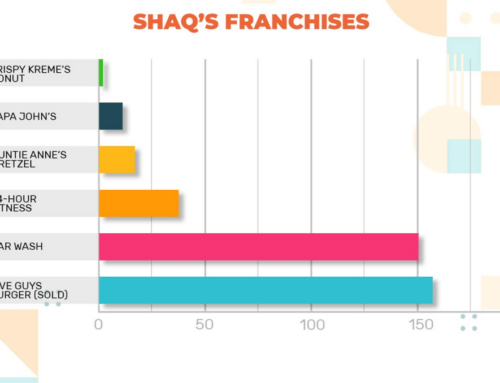Could you be fired from a franchise company you invested in? Sort of. You can’t technically be fired since you’re not an employee. But your franchise agreement could be terminated by the company, which is kind of the same thing. Of course as an employee, you didn’t invest $500,000 – $1 million or more as franchisee’s often do.
In this article, I break down the legitimate and illegitimate reasons a franchise agreement could be terminated to help you navigate this complex situation.
Legit reasons you could be terminated from a franchise
As a franchisee, you have to understand that although you cannot be fired, your franchise agreement can be terminated depending on the grounds on which both you and the franchisor agreed and signed on. The franchise agreement is final and is prepared by the franchisor. It’s best to thoroughly read your franchise agreement to understand fully what is expected of both you and your franchisor. Often times, it helps to hire a franchise lawyer to evaluate and explain the legalese in these contracts.
Here are the possible reasons why your franchise could be taken away:
- Failure to comply with the system standards – Because this is a franchise, you don’t have the freedom to change the branding, systems, suppliers, or processes in the business. Franchises have their own regulated system set from the beginning. This means, you have to follow their rules, and failure to comply with any of the things that were initially agreed upon can result in the termination of a franchise agreement.
- Failure to pay franchise fees – Multiple offenses are put in place when franchise fees are not paid in time. Avoid this and the possibility of your franchisor not renewing your contract or terminating your franchise agreement by making sure you keep up with royalty payments or brand fund contributions.
- A franchisee neglects or abandons franchise – As a franchisee, it’s your responsibility to keep the business up and running smoothly. If you neglect or abandon your franchise, the franchisor has the right to terminate you from the business.
- Engaging in activities that are damaging to the brand – Your job as a franchisee is to make sure the business runs well. This means, doing everything to promote and advertise the brand to potential customers. Obviously, engaging in activities that are damaging to the brand can only do more harm than good. If your franchisor knows of such activity, the possibility of being terminated is bigger. If you engage in illegal activities of any kind, it will be cause for removal.
- Failure to disclose correct information – Your relationship with your franchisor has to be built with trust. It’s a two-way process wherein you have to trust them to provide a viable business plan and structure. At the same time, it’s your responsibility to be honest with them about revenue numbers and royalty fees owned. If you fail to fail to provide accurate records as agreed upon, the franchisor could revoke the contract.
- Not having enough money in the bank – Although franchisees are given financial support in the early stage of the business process, they must have enough money in the bank to shoulder unexpected losses. This may happen when the lease on your location expires and you’re forced to move to a different location. Other times a black Swan event could happen that causes a temporary decline in sales like we saw at the beginning of the recent health crisis.
All the examples listed above are legitimate reasons a franchisor could terminate a franchise agreement. But, sometimes corporate entities are too aggressive in implementing these rules. For example, while getting a parking ticket is breaking the law this would not be grounds to terminate a franchisee.
Related Reading: How Much Does it Cost to Buy a Starbucks Franchise?
Additionally, while processes are too be followed as closely as possible if an auditor wants to find a problem with the operations of a business, they could certainly do it. A franchise must have reasonable expectations for franchisees who operate the business model.
Are franchise owners considered employees that can be fired?
Franchise owners are not considered employees and therefore cannot be fired. However, there are circumstances that allow the possibility of a franchisor to terminate a franchise agreement depending on the contract.
As I mentioned above, there are reasons for the termination of a franchise agreement and more often than not, failure to follow the contract is what usually leads to its termination. Although you are not considered an employee and cannot be fired, breaking the rules of your franchise agreement allows your franchisor to end the contract.
To give you a better understanding, a franchise agreement always has fixed terms, usually for 5 years. With this franchise agreement, a franchisee is also not allowed to just resign or walk away without reasonable cause or could be liable in damages.
A franchise agreement can be terminated in two ways: First, when the contract expires at the end of an initial term or second when one of the parties decides to terminate the agreement before it expires, which is usually done by the franchisor.
What are your rights as a franchisee?
Entering a franchise relationship is a big responsibility and knowing your rights as a franchisee is vital to keep things in place. Keep in mind that although the franchisor has the upper hand when it comes to this matter. But you as a franchisee have your own rights.
Before you sign a franchise agreement, make sure you know what your rights are, what you can and cannot do within the contract and during the course of the business. Now, let’s get into your rights as a franchisee.
- Financial assistance – Every franchisee has the right to financial assistance in the early stages of the business. This financial assistance may come directly from the franchisor or a third-party affiliated with the brand. Unexpected events happen when running a business and temporary cash infusions are needed to keep the business operating longterm.
- Competitive sourcing of the products, supplies, and services – The franchisor must be able to meet the requirements of the franchisee or relay trusted and approved suppliers for the products, services, and supplies needed to run the business. Your cost-of-goods sold can’t be so high that there’s no possible way to operate profitably.
- Training and support – The franchisee is entitled to training and support in order to effectively communicate the brand’s message to the customers. This training may only be at the start of the process but the franchisor must also provide materials and resources to help the franchisee better understand how to run the business.
- Use of logo and marketing material – As a franchisee, you have the right to use the logo and marketing materials to promote your service or products on social media, your website, company uniform, storefront, and others. This is one of the main benefits of joining a franchise concept.
- Full disclosure from the franchisor – Having full disclosure from the franchisor means you have access to the earnings data which is essential in operating a franchise. This is usually a factor for franchisees whether to sign the franchise agreement at the beginning. It’s your right to have the accurate sales and profitability data before signing on with a company. If the data provided is inaccurate it’s a major problem since it’s the primary information you used to make an investment decision.
Where can you complain about a franchise?
As I mentioned earlier, running a franchise business won’t always going to be smooth sailing. Considering the time and money investment you put into a franchise, you need to take measures to fight back.
What you can do is first, speak to your franchisor professionally let them know about your issues. Depending on what was agreed upon on the contract, your franchisor should be able to assist you with the problems in the business. This open communication is the best first step. When you make this communication, make sure to document the calls and emails. You’ll want to retain proof of these communications in the future.
Related Reading: The Story of Straw Hat Pizza Franchise
In the event that a franchisor fails to resolve your issues, the next step is to file a formal complaint with the FTC.
The Federal Trade Commission or FTC for short is an independent agency that enforces the civil U.S. antitrust law to promote consumer protection. This organization investigates reports on fraud, scams, and bad business practices. It is safe to say that if worse comes to worst, having the option to file a complaint through FTC is your best bet. Visit the FTC website, report what happened and follow the necessary steps as advised.
I hope that this guide helps franchisees gain additional knowledge dealing with franchise issues such as getting fired by franchisors and discover how they can prevent having their franchise agreement terminated.
Things to consider before buying a franchise
The more research you can conduct about a franchise, before getting involved the better. Do you best at looking objectively into the pros and cons of a business. Try to take your emotions out of the decision making as much as you can. Conduct online research so you understand if there are complaints from other franchisees about the company.
Embarking on any franchise venture involves a varying degree of financial risk and different skillsets. After all operating a restaurant is a lot different than managing a mechanic shop. Talk to other franchisees, ask them questions about earnings, operations, and struggles they faced. Doing research and gathering information can back you up in case things don’t go as planned.
With that said, here are some things to consider before buying a franchise:
- Assess your strengths – Are you a born leader or a diligent follower? Being a franchisee means having less power when it comes to handling the business. If you don’t think you can follow the set rules of your franchisor, this may lead to future problems and setbacks for your franchise. You need to be good at following a set game plan if you embark on this journey.
- Study the field – If you’re buying a franchise for the first time, it is best to do your own research and familiarize yourself with how franchises work. Having enough knowledge gives you the confidence to know how things should be going or how to deal with problems in case they arise.
- Have extra money prepared – You should not decide on purchasing a franchise just by looking at the minimum requirement for buying one. Consider the franchise fee, equipment fee, marketing costs, and more. It may take months to years before your business catches turns a profit. Are you prepared to persevere through these lean times? It’s wise to save extra money to cover your business’ expenses for up to 6 months.
- Talk to franchisees – What better way to learn the realities of owning a franchise than to speak with franchisees themselves. Doing so will help you better understand the business from a franchise owner perspective. Ask about the pros and cons, issues they faced, how much they spent, and unexpected issues or expenses they’ve encountered.
- Hire professional help – It always pays to get professional help for things you’re not good at especially when there’s a hefty amount of money involved. A business coach with experience with franchises can help guide you in the early days.
After assessing yourself and looking into what you need for a franchise, it’s now time to know how to select a franchise you want to purchase.

Do enough research before deciding what business you want to franchise.
How to select a franchise
With thousands of franchise options available, it can be difficult for business owners to choose which one to purchase. Here are few key aspects to consider before investing in a franchise.
- Proven Sales Record – The reason you’re purchasing a franchise is to capitalize on a successful enterprise. You need to choose one with proven sales success to ensure you that it is a brand with a market that can survive in the industry.
- Growing Market – You want to get involved with a market that is growing. For example, with the rise of subscription streaming services, now is not the time to franchise videotape rentals.
- Repeat Business – When looking into a business franchise, you want to choose something that will bring in repeat customers. Waxing shops and massage shops are great examples because they can add beauty/therapeutic services to offer to their customers.
- Competition – One of the good signs of a brilliant business idea is the lack of competition. Even if there are a couple of shops that sell footwear, not all of them offer other accessories that go well with their primary product.
- Personal Interest – There is nothing like working on a franchise that interests you. If you’re passionate about coffee and have further knowledge of this industry, it can be easier for you to handle the business and make it grow.
I hope this guide helps you understand the reasons you could be terminated from a franchise opportunity. If you follow the operation guidelines to the best of your ability and operate the business with integrity in most cases you shouldn’t encounter this problem.







